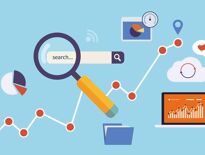When we talk about Search Engine Optimization (SEO), the concept of Off-Page and On-Page SEO comes into play. Today we explore 15 most important element of on-page SEO.
Before learning about these elements, let us first understand what is On-Page SEO and why it is important. In Digital Marketing and SEO, the On-Page SEO refers to the process of optimizing a web page in order to gain better results in SERPs (Search Engine Result Pages) for that particular page. Better results in SERPs will directly affect the sales for a business.
Another reason behind the optimization is to improve user experience in order to boost the chances of purchase of products or services from a particular website.
Now let us briefly discuss all the major elements that contribute towards improving the On-Page SEO of a website with this free seo training guide.
1. Content: The webpage content plays the most important and relevant part in on-page optimization of a webpage. A website or webpage with unique and high-quality content is always preferred by search engines over the websites with low quality content. If a website has high readability score, usefulness and uniqueness then it will boost the on-page of a website/webpage to maximum level. In order to learn to write high quality content, you would require to join Content Marketing classes rather than seo training classes.
2. Meta Title or Title Tag: Title or Meta Title tags is one of the most important on-page SEO factors. Title tag is an HTML tag that is used to specify the title of a web page. Title tag or Meta Title is displayed on SERPs and each webpage has its own Title tag. It should be unique and should contain your most important keywords. The maximum length for a meta title is 70 characters (including spaces) but the recommended length is max 60 characters.

3. Meta Description: Another important on-page SEO element is Meta Description. It is a short description of upto 160 characters (including spaces) about the content of a webpage. Meta Description is also displayed in SERPs for each web page. It should be unique for every page of a website and should contain the main keywords of that particular webpage.

4. Header Tags: The 4th very important element that boost On-page SEO of a webpage is header tags. Header tags are used to define the most important heading of a webpage. There are basically 6 heder tags wiz. H1, H2, H3, H4, H5 and H6. We should use our important keywords in H1 and H2 header tags to improve webpage’s SEO score.
5. Image Alt Tags: As search engines can’t read images, so the tag used to define images for search engines is called Alt tag or Alt attribute. Using Alt tag for all the images of your website helps in improving the search engine ranking of your website.
6. SEO-Friendly URL Structure: The URLs of your website’s internal pages should be SEO friendly. A SEO-friendly URL is the one which has the main keyword of your web page and doesn’t have special characters and numeric values. You should use “-” instead of “_” to separate words in the URL. Here is an example:
Not SEO Friendly URL: https://faspintech.com/seo_smo-&_ppc-1/
SEO-Friendly URL: https://faspintech.com/search-engine-optimization/
7. Image Optimization: The image optimization is very important as the webpages without optimized images loads slower than the ones with optimize images. Image optimization refers to the compression of images of a website while maintaining the image quality.
8. Website or Webpage Speed: One of the most important On-page SEO factors is Website speed. The website speed has a huge impact on user experience and search engine ranking. Google has started to discourage the ranking of very slow websites over the website that loads quicker. Website speed should be very good from SEO point of view and you can check the website speed with “Google Pagespeed Insights”.
9. Mobile Friendliness or Responsiveness: As with the evolution of smartphones, most users access the web using their smartphones. So, having a mobile friendly and responsive website is a must thing. Mobile friendliness and responsive websites gains better search engine exposure over other websites.
10. Robots & XML Sitemap: Although these two looks complex but they play very important role in crawling and indexing of a website. XML sitemap helps search engine bots in understanding which pages of your website need to be indexed where as robots.txt files defines which pages are allowed or disallowed from crawling by search engine spiders. These two should be used in collaboration and should not create a conflict in crawling and indexing of URLs.
11. Keyword Density: Keyword density defines the percentage (%) of a keyword in the webpage content. It can be calculated by dividing the total number of keyword instances by total words in the webpage content and then multiplied by 100. The keyword density should be maintained between 3 to 4.5%.
12. Text to HTMl Ratio: The Text-to-HTML ratio calculates the amount of text on a webpage compared to the amount of HTML code needed to display it. It should be between 25 to 70%.
13. Canonical Tag: A canonical tag or “rel canonical” is used to tell the search engines that a specific URL act as the master copy of a webpage. The canonical tag is used to prevent problems caused due to identical or duplicate content that appears on multiple URLs. It tells the search engines which version of a webpage URL should appear in SERPs.
14. Internal Linking: Internal linking is the technique of linking one webpage of a website to another webpage of same website. The internal linking helps in boosting the SEO i.e. Search Engine Optimization of a website/webpage.
15. Structured Data: Structured data is used by search engines to generate rich snippets for a webpage’s content in their result pages. Here is an example:

So, now we have briefly discussed all the 15 Major element of On-Page SEO. If you are willing to learn more about these elements for free then you can contact Faspin technologies Pvt. Limited. We are offering free seo training course to all graduate and postgraduate students.


